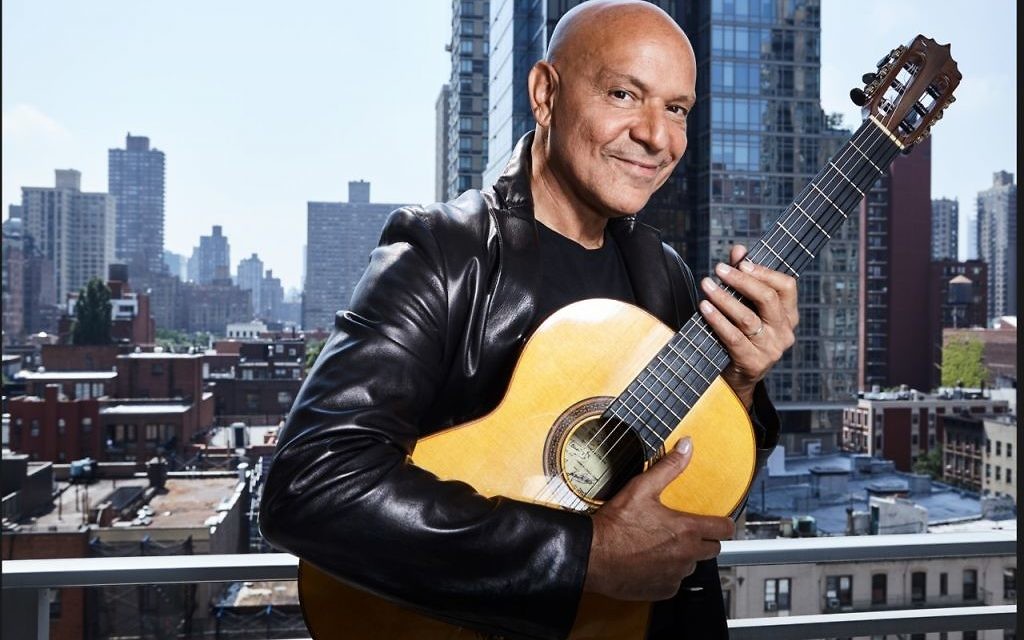Sephardic Musician Brings World Treasures to OVS
One of the world’s foremost experts in Sephardic music is scheduled to perform at Or VeShalom Nov. 4 and 5.
Gerard Edery is one of the world’s foremost experts in the music of the Sephardic Diaspora. He’s also a master singer, storyteller and flamenco guitarist.
Born in Casablanca and raised in New York and Paris, Edery is a citizen of the world who sings in 15 languages and speaks four fluently. Although he has performed since he was in his teens, it wasn’t until much later that Edery dug deeper into the cultural melting pot that is Sephardic music.
In 2003, Edery released the “Sephardic Songbook,” which has become a resource for musicians around the world to explore the genre.
Get The AJT Newsletter by email and never miss our top stories Free Sign Up
On Saturday, Nov. 4, he will perform at Congregation Or VeShalom with singer Maria Krupoves, an interpreter of the folk songs of Central and Eastern Europe. They will present an ecumenical celebration of the origins of Christian and Jewish folk music.
It will be Edery’s third time performing at Or VeShalom.
Edery spoke with the AJT by phone from a tour stop in Warsaw.
AJT: Tell us about your trip to Atlanta and what you’ll be doing.
Edery: I’ll be an artist in residence again at Or VeShalom, so I’ll be co-leading the Shabbat services in the evening and on Saturday morning, and then on Saturday night I’ll be doing a full-length concert. This time I’m performing with a longtime colleague from Lithuania, Maria Krupoves. She and I met a few years ago in New York, and we have created a program which covers a repertoire from all over the Middle East and Europe in about 10 languages. She has done the same thing with Eastern European music that I’ve done with Sephardic music. It’s a very rich, cross-cultural program.
AJT: So how did you get back into playing and recording Sephardic music?
Edery: I really started playing more Sephardic music around 1992, which was the 500-year anniversary of the expulsion of the Jews from Spain. After that, I started to get calls for concerts, and I started doing less opera and classical music and much more of this research and performing of my heritage. When I began doing this, there weren’t many people contemporizing the music like I was. I like to think I bring it to the modern age.
AJT: Why is Sephardic music so diverse?
Edery: After the expulsion from Spain, there was a huge Diaspora. Everywhere Jews went, they left part of their culture there and influenced the host cultures. In turn, they were influenced by those cultures as well. So they absorbed musical styles and traditions and blended them with their own. So it becomes an incredibly rich panorama of styles, languages and poetic sensibilities. It’s an incredible repertoire that transcends time.
AJT: You have training in jazz, flamenco, opera and classical music. How do you bring those styles together when you perform?
Edery: When I try to describe my music, it’s difficult because it’s so broad. But I would say that I fuse many different elements together. All of these influences are part of who I am. I’m not going to do this music in a traditional way because I can’t. There are so many other musical influences that I need to express.
AJT: You’ve been performing for a long time. Can you talk about how you go about connecting with an audience?
Edery: I’ve been a communicator all my life. It’s just one of my gifts. I want to relate to people, and I love to sing for people and to not only tell my stories, but to hear theirs as well. It’s about being able to communicate as well as being able to listen. The best artists in my opinion are the ones who listen to the audience on many different levels.
AJT: Is there a message that you try to pass on when you perform?
Edery: Respect for all people. Love. To make love and joy and happiness something you can communicate and make people feel. The message is one of peace and to bring some calm, loving energy into the world, which this music very much enables me to do.
Who: Gerard Edery and Maria Krupoves
Where: Congregation Or VeShalom, 1681 North Druid Hills Road, Brookhaven
When: 8 p.m. Saturday, Nov. 4
Tickets: $25 for members, $35 for nonmembers; orveshalom.org or 404-633-1737





comments